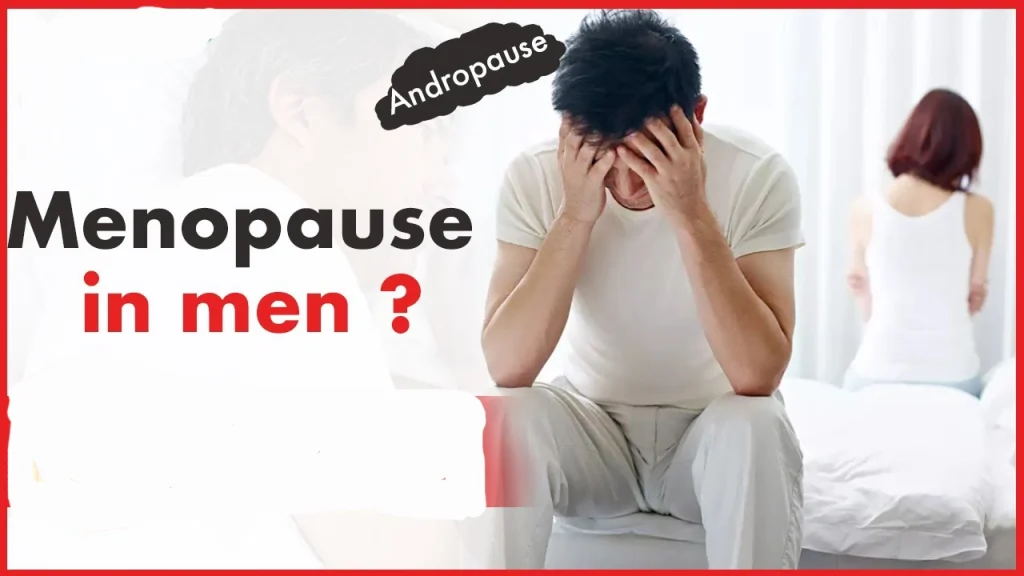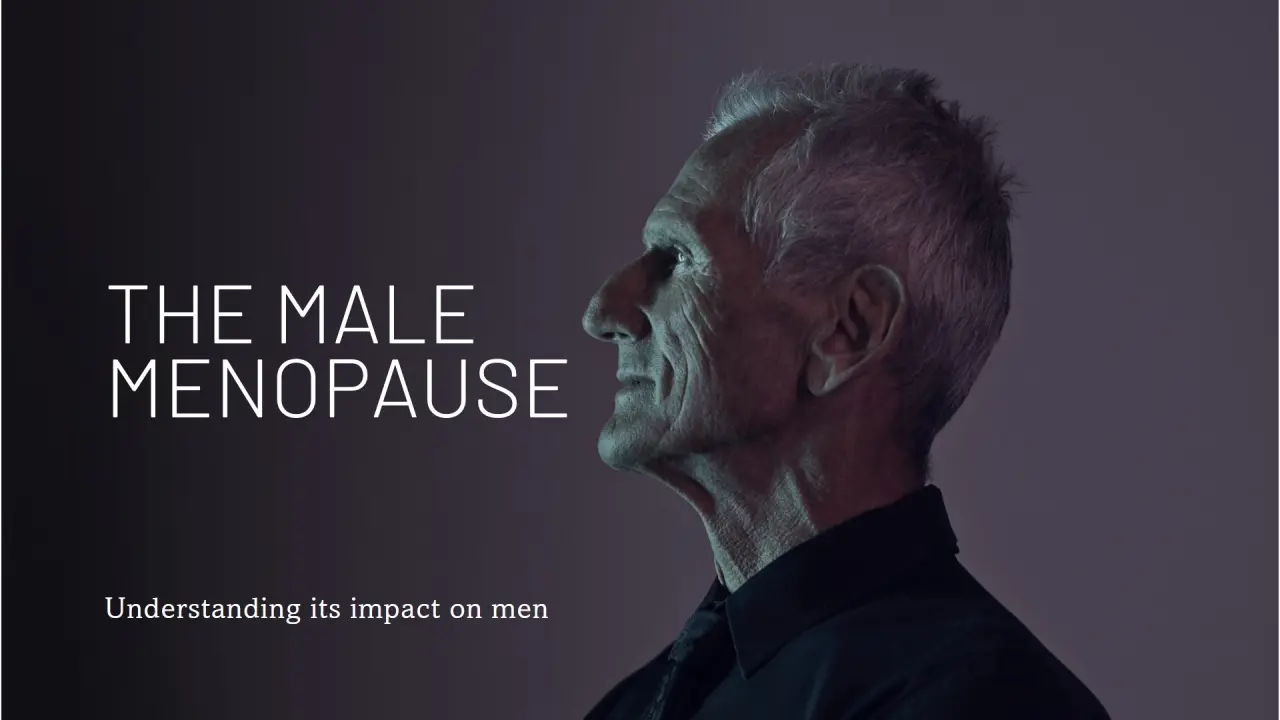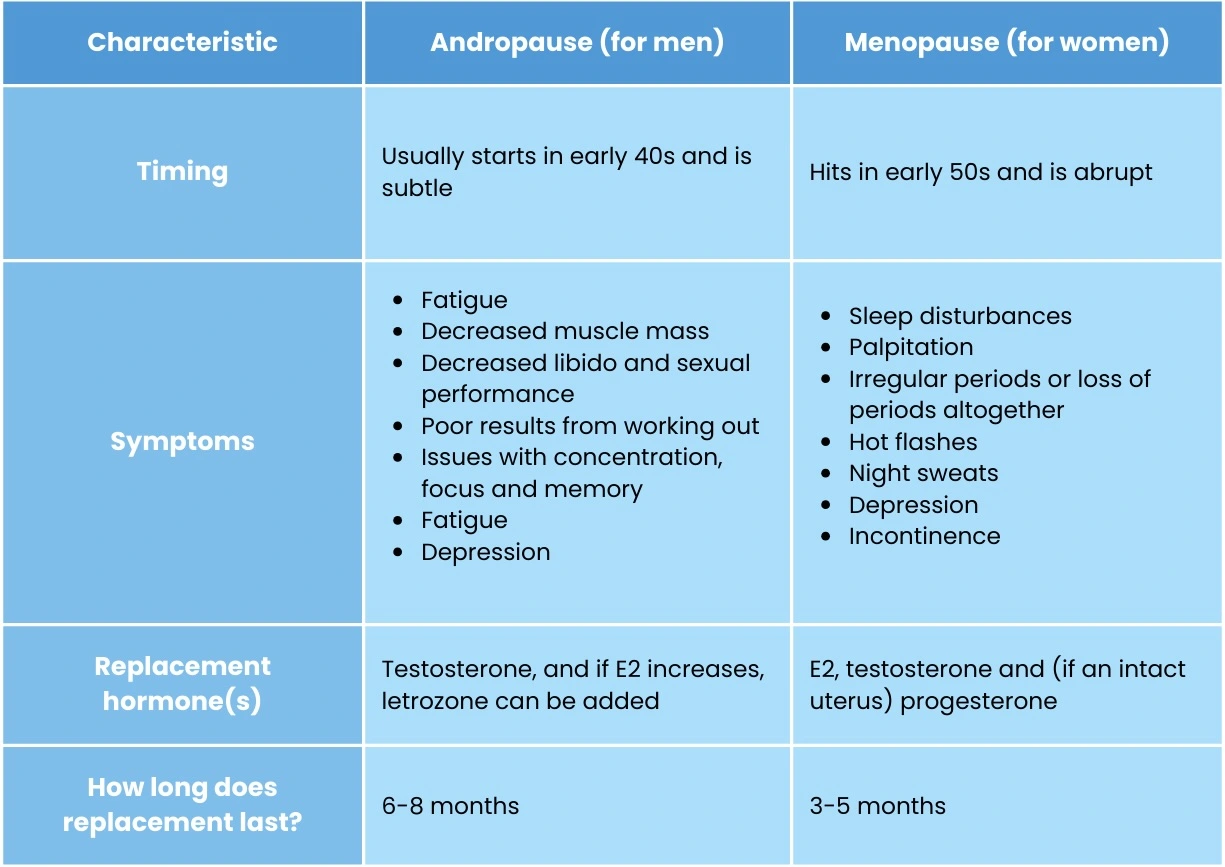
Menopause in Men: Causes, Symptoms, Treatments
Statistics show that 20% of men over 60, 30% of men over 70, and 50% of men after 80 experience a decrease in male sex hormones, or male menopause. People view menopause as a female term and a physiological phenomenon in which female hormones and menstruation cease around the age of 50. Interestingly, a similar process is seen in men, but the course of menopause in men is different and much slower than in women, to the point that it is not noticeable to men. However, in some men, this decline is so rapid that it causes physical and marital problems.
Hormonal changes related to aging in men are different from those in women. The occurrence of these changes is natural, but unlike the sudden drop in reproductive hormones during female menopause, the decline in hormone production in men occurs slowly. Familiarity with the signs, symptoms, and treatment methods for this issue helps to better understand it. In this article from the Human Health Mag website, we will examine menopause in men, symptoms of decreased male hormones in men, differences and similarities between male and female menopause, and etc.
What is Menopause in Men?
Male menopause or menopause in men describes age-related changes in male hormone levels. This same group of similar symptoms is also known as testosterone deficiency, androgen deficiency, and late-onset hypogonadism. Male menopause involves a decrease in testosterone production in men aged 50 or older. This is often related to and continuous with hypogonadism. Both conditions include decreased testosterone levels and other similar symptoms.
If you are a man, testosterone is the hormone produced in your testicles. It does more than just boost your sexual potency. Testosterone also fuels and strengthens changes during puberty, boosts your mental and physical energy, maintains muscle mass, and regulates other key developmental characteristics.
Another name for menopause in men is andropause, which begins with hormonal, physiological, and chemical changes very similar to those in women’s menopause. These changes start with a decrease in the secretion of the testosterone hormone. The process of testosterone decline in men naturally begins from ages 25 to 75 and peaks between 45 and 50.

In women, the process of ovulation ends, and the decline in hormone production occurs over a relatively short period, which is called menopause. In men, the decline in testosterone and other hormones happens over several years, and the consequences are not necessarily noticeable. The gradual decrease in testosterone levels in men is more commonly known by the term “male menopause,” but the correct meaning is late-onset hypogonadism or age-related testosterone decline.
What Are the Symptoms of Decreased Male Hormones in Men?
Decreased libido, reduced muscle mass, decreased concentration, sleep disorders, weakness, listlessness, and early fatigue can be symptoms of decreased testosterone. However, the presence of these symptoms does not solely mean male menopause, and a laboratory examination must be done.
Does this mean hormone levels must be measured in a lab?
In the laboratory, the level of testosterone in the blood is measured. If the hormone level is less than 200 ng per 100 cc of blood, andropause or menopause in men has occurred. If it is between 200 and 300 ng per 100 cc of blood, it indicates a decrease in the hormone or the beginning of menopause.
In men who are menopausal or in the process of menopause, cholesterol and LDL hormone levels are also checked, as these two increase with the cessation of male hormones, which is a factor for atherosclerosis and increases the likelihood of heart and brain attacks. Therefore, preventing early menopause and delaying it plays a crucial role in men’s sexual and physical health.
Why Is Testosterone Important?
Testosterone is a hormone present in both men and women, with its production primarily handled by the testicles and ovaries. The level of this hormone is naturally higher in boys and men, where it acts as the primary sex hormone. This hormone has many biological roles, which you will learn about below:
- Growth of the male penis and testicles;
- Deepening of the voice during puberty;
- Growth of facial and pubic hair during puberty;
- Regulation of muscle size and strength;
- Regulation of bone growth and strength;
- Creation and regulation of sex drive (libido);
- Activation of sperm production.
Is a Decrease in Libido in Men Always Due to a Decrease in Sex Hormones?
A decrease in libido or sexuality in older adults men may have its roots in psychological issues like depression, mood disorders, or physical illnesses like diabetes, chronic high blood pressure, etc. Also, men who don’t get good sleep, have stressful jobs, and generally have a poor quality of life may have a decrease in libido without their testosterone levels being low. Sometimes, the cause of the cessation or decrease of testosterone is from somewhere else.
Testosterone secretion is regulated by a gland called the hypothalamus through the secretion of a hormone called GnRH. This hormone stimulates the pituitary gland, and another hormone called LH is secreted, which stimulates the testicles to secrete testosterone. If for any reason there is a disorder in this pathway, testosterone secretion will face problems. Therefore, when a man consults a doctor with a complaint of decreased libido, all aspects should be considered.

Differences and Similarities Between Male and Female Menopause
Female menopause usually occurs within a limited age range of 45 to 65. However, in men, from the age of 35 onwards, andropause can occur at any time, and one of the reasons it is often overlooked is that its onset is much more gradual than in women’s menopause, but its long-term effects are severe. Although the most obvious signs are a loss of interest in sexual activity and erectile dysfunction, which should be considered a crisis in the patients’ lives and masculinity.
The main difference between male and female menopause is the faster changes and more apparent signs in women and the more gradual and milder symptoms in men. But the most important and fundamental difference is that when women go through the menopausal stage, they all lose their ability to procreate, whereas men in andropause still retain this ability.
The Relationship Between Testosterone Secretion Levels and Menopause in Men
Whether these changes are directly related to the decrease in testosterone levels has been a subject of serious debate. Some doctors believe that the decrease in testosterone should be compensated for with testosterone replacement therapy.
In men’s bodies, testosterone production decreases with age, which is a natural process. Nowadays, testosterone therapy has become increasingly popular, but it may have severe side effects such as an increased risk of prostate cancer, heart attack, and stroke, especially in older men. Many middle-aged men with normal testosterone levels experience a decrease in libido, depression, or fatigue caused by a number of lifestyle or health factors (such as job loss, marital dissatisfaction, obesity, etc.) that are not directly related to testosterone.
A low testosterone level in an elderly person does not necessarily mean they have male menopause. Signs of low testosterone in the body can include headaches, reduced vision, a decrease in height due to osteoporosis, and anemia.

What Are the Symptoms of Menopause in Men?
Although some of the symptoms of male menopause are the same as those that menopausal women experience, these two have a few fundamental differences. Menopause in most women occurs suddenly and has significant biological changes that show themselves over 1 to 2 years. In contrast, in men, the decrease in testosterone levels and the onset of related symptoms usually happens over a longer period.
When testosterone levels decrease in men, they may experience specific symptoms, some of which are similar to those of female menopause. The most common symptoms of male menopause include:
- Extreme weakness and fatigue
- Depression and irritability
- Decreased libido and other related problems
- Impaired concentration and short-term memory
- Increased body fat
- Sleep disorders (insomnia or sleepiness in the elderly)
- Low energy
- Depression or sadness
- Reduced motivation for life
- Decreased self-confidence
- Reduced muscle mass and a feeling of physical weakness
- Enlargement of men’s breasts
- Decreased bone density
- Erectile dysfunction
- Male infertility
You may also have swollen or tender breasts, reduced testicle size, body hair loss, or hot flashes. Low testosterone levels associated with menopause in men are also linked to osteoporosis. This can cause your bones to become weak and brittle. These symptoms are rare. Although a decrease in testosterone production is natural as men age, they rarely notice the changes caused by it in their thirties and forties. The symptoms of menopause in men show themselves more in their late forties and early fifties.
Is There a Treatment for Male Menopause?
The best treatment for menopause in men is prevention, and all men should improve their quality of life, especially after the age of 40. For example, they should exercise, eat well, and control underlying diseases like diabetes and high blood pressure.
In cases where there is a disorder in the testosterone secretion pathway, the patient’s problem can be resolved by replacing hormones like GnRH or LH. But when a man is diagnosed with andropause and low testosterone, the best course of action is to start treatment.
Your doctor can take a blood sample to measure your testosterone level. Male menopause can make you uncomfortable or disrupt your life, but you can probably manage your symptoms without treatment.

The biggest obstacle to treating menopause in men may be your willingness to talk to your doctor about your symptoms. Many men are too anxious or shy to discuss their sexual issues with doctors. The most common type of treatment for male menopause symptoms is adopting a healthy lifestyle. For example, your doctor may recommend that you:
- Eat a healthy diet
- Get regular exercise such as exercise to treat premature ejaculation
- Get enough sleep
- Reduce your stress
These lifestyle habits can be beneficial for all men. After adopting these habits, men with menopausal symptoms may see dramatic changes in their overall health. If you are prone to depression, your doctor may prescribe antidepressants, therapy, and lifestyle changes.
Testosterone replacement therapy is another treatment option. However, it is very controversial. Like performance-enhancing steroids, synthetic testosterone can have harmful side effects. For example, if you have prostate cancer, your cancer cells may grow. If your doctor suggests hormone replacement, weigh all the consequences and negative aspects before making your decision.
What Are the Benefits of Testosterone Replacement Therapy?
Testosterone replacement therapy is often effective in reducing and controlling menopause in men and has various methods, which you will learn about in the list below:
- Injections by the patient themselves;
- Topical gels;
- Pills;
- Nasal spray;
- Small, spherical tablets placed under the skin of the hip that slowly dissolve over a 3 to 6-month period.
Testosterone replacement therapy is generally safe and works especially well to help men who want to improve their overall desire and satisfaction with sex. It doesn’t matter whether these individuals have male menopause or not. Testosterone deficiency is the first thing a doctor checks for in men who have a decreased sex drive.
What Are the Limitations of Testosterone Replacement Therapy?
Although this treatment is safe, it is not suitable for everyone. For example, men with a history of prostate cancer should consult with their doctor about the benefits and risks of this treatment. It is worth noting that testosterone does not cause prostate cancer, but it may increase the growth rate of prostate cancer cells.
Testosterone replacement therapy also affects fertility. Some individuals with male menopause and fertility problems mistakenly believe that this treatment will increase their sperm count by correcting testosterone levels.
In fact, the brain of a person who starts testosterone replacement therapy stops sending certain signals to the testicles, and as a result, the sperm count in men who use injected testosterone drops drastically, and in some individuals, this number reaches zero.
Testosterone is only one piece of the often-complex puzzle of men’s sexual and reproductive health problems. Sex drive issues are more complex than being dependent on the presence or absence of a single hormone, and men also need a certain amount of estrogen in their bodies to have a healthy sex drive. Additionally, regardless of whether the body’s testosterone levels are normal or not, psychological issues can also have a major impact on sex drive and erectile dysfunction.
For this reason, specialists also recommend complementary psychological treatments for men who suffer from decreased sex drive, erectile dysfunction, and related problems.
Concluding Remarks
The natural changes of the body are not embarrassing! Menopause in men is one of the natural body changes that, in addition to physical problems and impaired sexual function, can also lead to mental health issues in elderly and psychological problems, some of which can only be resolved by visiting a psychologist. Do not be ashamed to visit a psychologist for this reason and think about the effects that his help can have on improving the psychological quality of your life. It is normal for your testosterone levels to decrease as you get older. For many men, the symptoms can be controlled even without treatment.

Frequently Asked Questions
Why Do Men Experience Menopause?
Menopause in men appears with a decrease in the testosterone hormone, which is a type of androgenic hormone. This decline occurs in all men after the age of 40. However, testosterone secretion follows a downward trend but does not stop, and men do not lose their fertility. The rate of androgen decline in each man is about one percent annually. Statistics show that 20% of men over 60, 30% of men over 70, and 50% of men after 80 experience a decrease in male sex hormone levels.
What Should Men Do to Avoid Male Menopause or at Least Delay It?
The decrease in blood testosterone with age is inevitable and part of the body’s physiological phenomenon. To make menopause in men milder and delay its onset, a healthy lifestyle is necessary. Smoking, alcohol consumption, lack of physical activity, being overweight, consuming unhealthy foods, having psychological illnesses, having underlying conditions like uncontrolled high blood pressure and diabetes, and using psychotropic drugs gradually lead to a decrease in male hormones and the onset of premature andropause in men.
When Do Testosterone Levels in the Body Decrease?
Testosterone deficiency occurs when a man’s body does not produce enough of this important hormone. This deficiency can happen at any age, but it is more common in older men. To better understand the impact of age on this problem, it’s worth knowing that less than 10% of men under 50 have testosterone deficiency, while half of men over 80 suffer from it.
